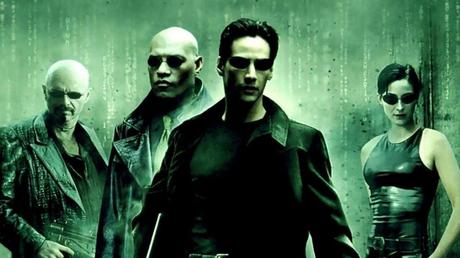
Cypher, Morpheus, Neo and Trinity in the original The Matrix (1999)
Mind-bending. Futuristic. Timeless. Brainteasing. Confusing. Your basic black. All of the above and more. Everything about The Matrix (1999) is calculated to throw the viewer off. To let audiences in on the "inside joke," and what a joke it undoubtedly becomes! That the world isn't real after all. What you see, what you touch, what you feel, what you hear, what you taste, what you smell are not real. They're all an illusion. An elaborate trick of the mind, a manipulation of one's viewpoint. They are what human beings have been "tricked" into accepting about the true nature of reality.
Nothing beats that opening sequence of leather-clad Trinity (athletic Carrie-Anne Moss) outrunning, outfighting, outgunning, and outsmarting the local lawmen, to involve the nefarious, inscrutable men in suits and dark glasses, those so-called "agents." Are they secret agents? Russian spies? Makeshift 007s in disguise? What? At this early point, nobody knows. And who is Trinity, anyway? Part of the Holy Trinity? In the name of the Father, the Son, and the Holy Spirit?
Flash forward to lowly thirty-something programmer Thomas Anderson (Keanu Reeves), aka "Neo" (meaning "new," "recent," "revived") to the cyber world, who appears in his cubicle going about his business. He's another of those corporate cogs in the perpetually grinding wheel of business. Suddenly, the chase is on to learn what this talented, upwardly mobile computer geek knows, if anything, about the Matrix. Which, at this point in the drama, is practically nothing. All Neo has about him are suspicions, a feeling that something's not quite right with the world. That it's a little... off.
Neo's in the same place as viewers are, part of that unseen crowd watching his every furtive move: he and they are clueless bystanders on the literal cusp of a world beyond their understanding. Today, when people think of a geek, it's of the computer programming variety, not the carnival freak who bites off the heads of chickens, as in Mexican director Guillermo del Toro's Nightmare Alley remake. Oh, no. The "geek," in this formulation, happens to be one of those obsessive-compulsive types who barely gets a decent night's sleep on his bare cot in a one-room loft somewhere in the darkest reaches of urban blight.
This is fine as far as it goes with viewers, who have neither a clue nor a care as to what it is these mysterious agents are after; or why Neo bothers to run away from them when he hasn't done anything to provoke their wrath. Not to our knowledge, that is.
Ah, but wouldn't you know it: Mr. Anderson, we soon learn, has a neat little sideline in that he provides paying customers with illegally bootlegged software. Hmm... He's also a sucker for a pretty face, especially the foxy lass who accompanies that strung-out bunch that knock on his door late one night. Is anybody home? Goodness me! Is that Neo? Why, he's so pale! He looks like a ghost out of his shell.
Prior to that knock, Neo receives a computer message from the equally mysterious Morpheus (portentous Lawrence Fishburne) - in Greek mythology the god of Dreams, something the restless Mr. Anderson desperately lacks, along with a good night's sleep. Morpheus gives him some cryptic directions to "follow the white rabbit." (Are you listening, Alice dear?). As Neo is about to turn down the foxy lady's invitation to go out and party, he spots the tattoo of a white rabbit emblazoned on her bare shoulder. In an instant, he changes his mind. Yeah, he'll go out with them. Why not? Things happen fast in the Matrix. And furiously so!
At the discotheque, Neo falls hard for the lovely Trinity. She's the kind of girl who leaps tall buildings not just in a single bound but in multiple, gravity-defying vaults - a veritable wonder woman in patent-leather tights! I'm sure Neo thinks to himself, "Why can't I do that?" Patience, Mr. Anderson. There's more to this story than even computer whizz Neo knows. Not only does Neo learn to defy gravity, he becomes in the end a veritable savior in flowing black robe and glasses, a Jesuit priest worthy of Saint Ignatius of Loyola.
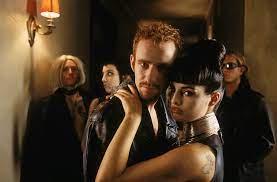
"Follow the white rabbit!"
The premise of the Wachowski Brothers (now the Wachowski Sisters) in The Matrix (1999) has been carved out of the laudanum-fueled mind of Lewis Carroll's Through the Looking-Glass, and What Alice Found There; of seeing and experiencing a world with "new eyes," one distorted out of all normal proportions; an out of focus, green-tinged perception of reality over an endless trail of bar lines and static-electronic configurations running up and down the picture frame - all of it taking place behind an inky-black backdrop. Man, talk about bleak! The feeling one has, as it might have been for viewers from an earlier television age, is of viewing life through The Twilight Zone, or of being sucked into The Outer Limits of one's mind.
Lead Agent Smith (Hugo Weaving) speaks in a slow, methodical, emotionless monotone, giving equal weight to his words and making every vowel and syllable as plain as day for the seemingly dense Mr. Anderson. What is it that Agent Smith wants? Why are these accusations of cyber-spying being leveled at poor, helpless Neo? And what are these agents all about? Why is this simple program writer made the object of such harsh treatment? Mr. Anderson may or may not be in on the agent's game. At this point, anything goes.
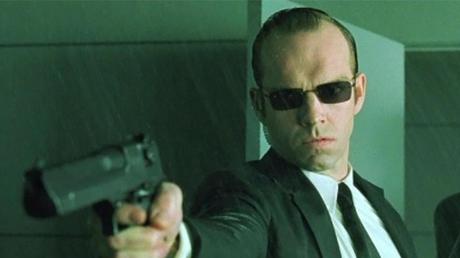
The lugubrious Agent Smith (Hugo Weaving) in hot pursuit
But Thomas Anderson does not give in. Instead, he flips the mysterious men in dark glasses the "bird" (the middle finger, in everyday parlance), which signals his lack of cooperation. They're getting nothing out of him, of that he is certain. True, but in retaliation the agents grab hold of Neo and place something inside Neo's innards: an honest to goodness mechanical bug. Makes your skin crawl, doesn't it? The bug burrows deep inside Neo's naval cavity to make short work of his innards. Geez, what a nasty looking creature, a combination crawdad and scorpion with a whiplash tail to boot.
After all this, can we be certain that Thomas Anderson is, in reality, the notorious Neo these badass agents are after? And is he in league with the head of a vast criminal enterprise? Agent Smith (named, perhaps, after the evil but comical Dr. Smith from the sixties series Lost in Space) thinks so. He queries Neo about his connection to the elusive Morpheus. In Smith's world, Morpheus is a known terrorist, a perpetrator of cybercrime and other illegal acts. Nice to know. Which makes this film an excellent modern-day example of the genre known as cyberpunk, of which authors William Gibson, Bruce Sterling, Philip K. Dick, and others were masters of. As the name implies, cyberpunk relates to a computer-based manipulation of an individual's consciousness, along with the edgier, nonconformist attitude familiar from punk.
Suddenly, Neo awakens to find himself back in his shabby little room. He looks about the place. Hmm, nothing's amiss, all's quiet on this storefront. Was it all a dream? Some horrible, impulsive nightmare? But how? But when? Tricks of the mind? He's awake now, isn't he? Those terrible visions never happened, did they? Um, not quite.
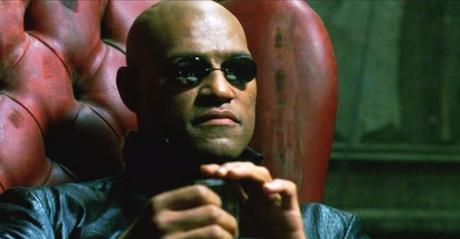
The mysterious Morpheus (Laurence Fishburne) in The Matrix
Neo gets a phone call from the elusive Morpheus (now, how did Morpheus get his number... oh, never mind), who confides in him (in more or less ambiguous fashion) that he has been looking for Neo his entire life. Could Neo be the source of all knowledge concerning the Matrix? What is the Matrix, anyway? Indeed, that is the question that Hamlet wannabes Trinity, Morpheus, Cypher (Joe Pantoliano), and, by extension, practically everyone else associated with the plot, pose and want to find the answer to.
Still curious from his meeting with the agents, Neo takes his chances. He grapples with the idea that life - his life, and everyone else's - may be some horrible dreamscape. With that in mind, Neo agrees to meet Morpheus in person. Wouldn't you know it, the weather outside is frightful. It's pouring rain (fitting for a noir-based blockbuster). In a flash, a dark limousine pulls up with leather-clad Trinity and several other adherents inside. They take Neo to Morpheus' hideaway, but before heading out they perform a little surgery on him. That bug, the one that the lugubrious Agent Smith inserted into Mr. Anderson's abdomen... that's a no-no. So out it comes. Yuck! They drop the mechanical device onto the rainswept street. Lights out and good riddance.
Finally, we arrive at Morpheus' abode. Checkerboard tiles, with a spiral staircase. Hmm, classy. High ceilings, too. Neo shakes hands with the leather-clad Morpheus. Bald-pated and sporting little dark eye shades, Morpheus is soft-spoken and measured in his speech, as cryptic and reserved as an Egyptian Sphynx. What gives with that? Are Morpheus and Neo one and the same person, two sides of the same monotoned coin? Different renderings of the same character, or purely contrasting pairs? This is far and away the most intriguing aspect of these two personalities, or protagonists if you will: a light- and dark-shaded, mirror-imaged characteristic of one another, yet polar opposites in their views of humanity and the world they each inhabit.
Are we talking about the real world? Or the world of the Matrix?
The essential questions of what it all means and where viewers will be taken on this whirlwind rollercoaster ride will eventually be answered (well, somewhat) as the series progresses. Indeed, the real world, as illustrated and made known to Neo, is a dreadful place, a barren wasteland where humans, if you want to call them that, are no more than living batteries, charged (no pun intended) with providing the sustaining life force for gigantic, insect-like robotic beings, most of which are cybernetic in nature. A nightmare vision of decay amid a vast array of machinery. Ghastly and hideous!
It's Alice tumbling down that rabbit hole, a perpetual dream from which no one can escape - unless one has attained enlightenment. This is what Morpheus intends to convey to a still disbelieving Neo. He and everyone else have, according to Morpheus, been blinded to the truth of their existence. The wool has been pulled over the world's eyes. We have all been duped. We are part of a vast conspiracy, one that hides the reality from our prying eyes. But who's to blame? The government, the Justice Department? The so-called deep state, or Big Brother, as George Orwell foresaw three quarters of a century ago? Old Roz keeping her eyes on one-eyed Mike Wazowski in Monsters, Inc? "I'm always watching you, Wazowski. Always watching." Don't open that door, Mike! You might never come back! (Author's Note: The similarity in names between Mike Wazowski and the Wachowskis must not be overlooked.)
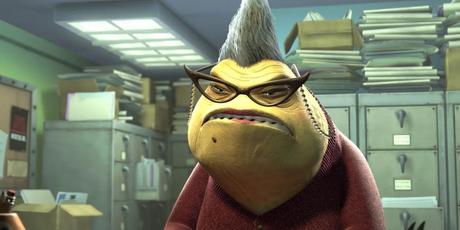
"Always watching" Roz, from Monsters, Inc. (2001)
Blue pill, all is well. Red pill, all is hell. Take one and see, take the other and remain blind. Oblivious to what is around you. Are there no other choices? Life has many more possibilities than what viewers are shown, but The Matrix concerns itself with a binary choice, no other options allowed. There is a price that must be paid for every decision. Choose wrongly and you remain a pawn, your life governed by what others (in this instance, computers) want or expect of you. Choose rightly (or whatever "rightly" means in this context) and you suffer the consequences of dealing with too much knowledge. Where does one go from there?
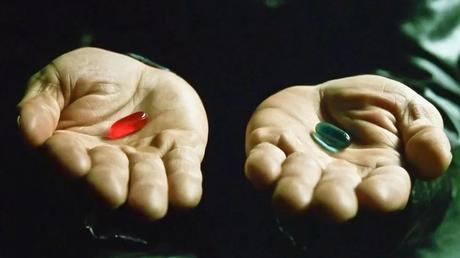
Morpheus offers Neo the "truth," nothing more. Oh, really? They are all wizards of the odd. Neo literally goes through the looking glass, in fact the mirror melts before his eyes. No, right into his open mouth and within his vital organs. The truth makes itself felt inside him, but does it make him free? Truly free? He's certainly freed from his bonds, but it is a terrible truth that he sees. And, as Morpheus warned, there is no turning back to that primal soup. Neo is rejected, flushed down and out and away, like so much waste product, disgusting and nauseating. He's akin to a piece from those old-fashioned penny arcade machines, whereby a hook hovers over to pick up that prized kewpie doll and deposit it into a convenient aperture, as you receive the dime store's gift through a hole in its bottom. A mechanical giving of birth, don't you think?
So that's what the Matrix and The Matrix are about! Releasing ourselves from the burden of being lifelong Eveready batteries! Neo is reborn and reintroduced into the real world, as opposed to the "reel" or cinematic one. As a consequence, he saves himself from becoming a human pin-cushion, the needles of which his newly acquired "friends" ever-so-gently remove, one-by-one, leaving only scars. He's restored to his natural state, rather too quickly I'm afraid. But it's only the beginning of his, um, adventure in... well, Wonderland. And the demise of the human species as a consequence of artificial intelligence, which we ourselves have created. How ironic! We're to blame for our own messes. Now, isn't that enlightening?
Today, humans, as a species, stand at the entranceway to a portal, the door to the world beyond. Do we step into the Matrix or do we keep the door closed? If we open the door, a door that might in fact be Pandora's dreaded box of earthly ills, do we walk through or inside it, as Morpheus suggests? Or do we consult the Oracle (charismatic Gloria Foster), whose words of wisdom are nothing more than precious, homespun homilies for the ill-informed? Watch out for that jar, Neo! It's going to fall. How do we know that? Because we saw it.
We have been bent into and out of shape by Super Cybernetic Man (Neo and/or Morpheus), by the Oracle herself (i.e., the Wachowskis), by Bullet Time (the act of bending the mind's eye), by location footage (downtown Sydney, Australia), by multiple Agent Smiths (Hugo Weaving), by Eastern philosophies; by comic-book art, pop culture, syntheses of Japanese anime, and kung fu and waishu movies; by alternative universes, green-tinged backgrounds, shifts to blue and black, and back to sickly green again, and by cyberpunk.
But let's step back and take a little wisdom from Plato's cave. Stir in some Cartesian philosophic thought (that is, from Frenchman René Descartes' Cogito, ergo sum, or "I think, therefore I am"), sprinkle with the above ingredients, and what do you have? You have The Matrix. And Neo is the One.
The trick, as a little boy tells Neo prior to his speaking with said Oracle, is to know that what you are looking at may not be what you think it is. "There is no spoon," he says matter-of-factly, as the spoon bends out of and back into shape before us.
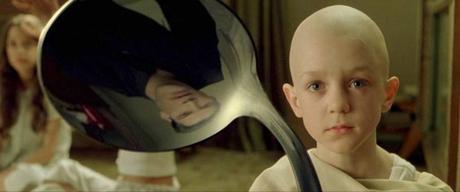
That's the viewer, people! Bent in and out of shape, and back again.
Copyright © 2023 by Josmar F. Lopes
